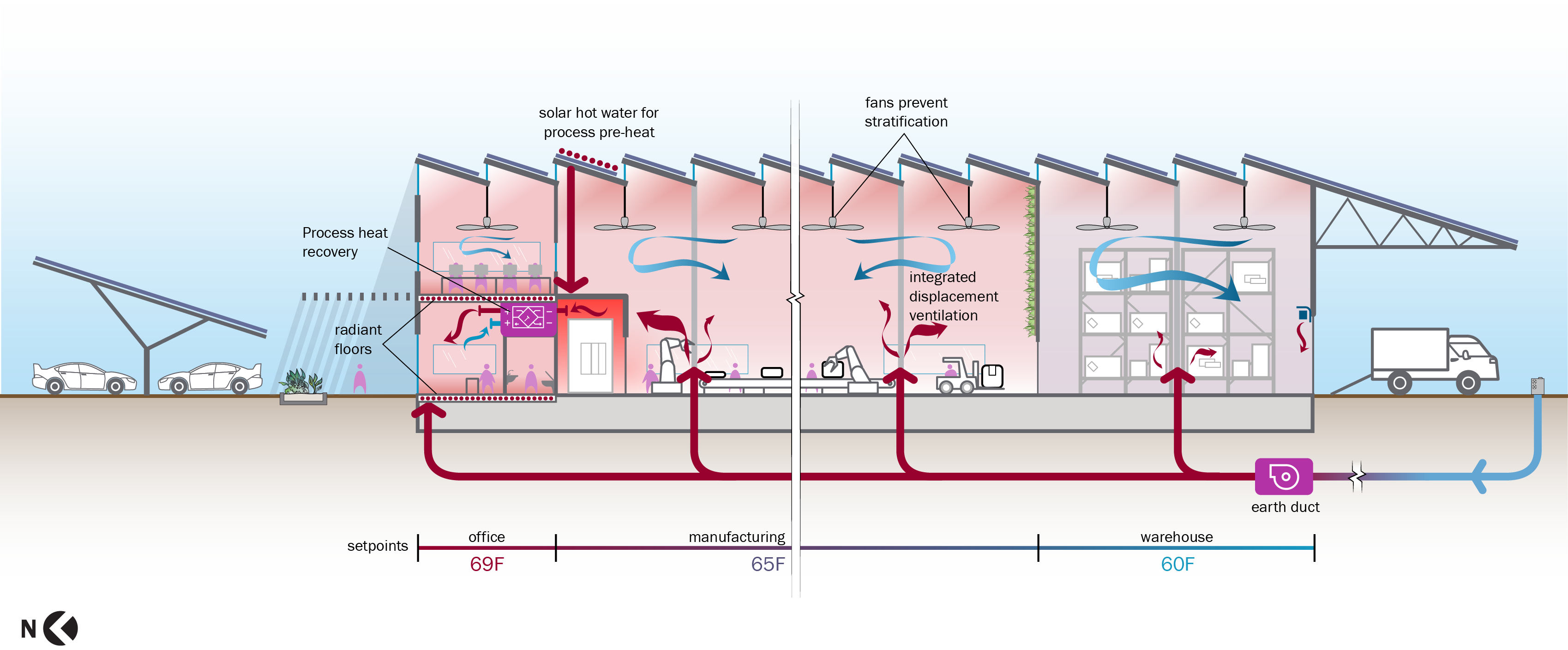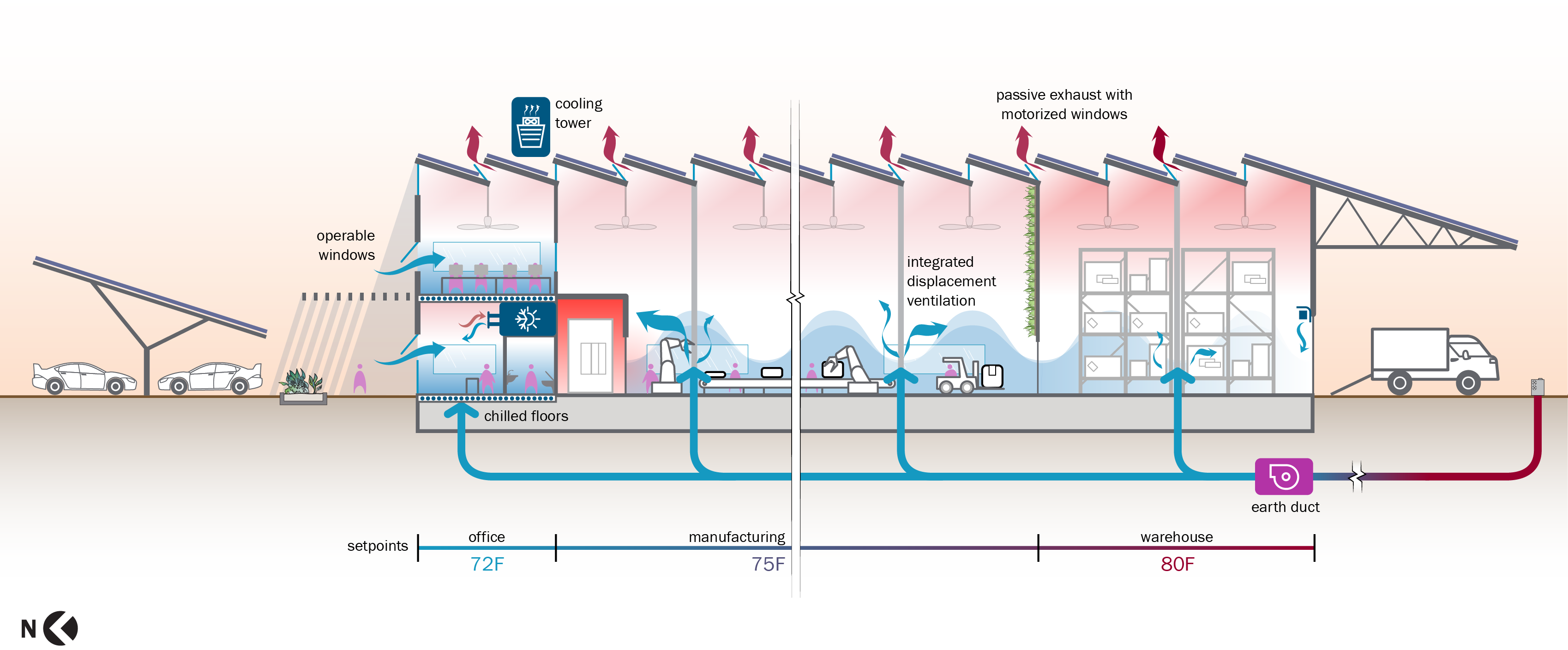
Hydrogen Factory Sustainability Strategizing
What:
Where:
When:
For:
With:
Where:
When:
For:
With:
Hydrogen Capsule Factory
New Mexico
2023
NDA
Atelier Ten
New Mexico
2023
NDA
Atelier Ten
Designed as a 24/7 assembly facility for modular hydrogen capsules to transform the airline industry, this client sought a similarly sustainable factory facility for them to operate from. Atelier Ten recommended several key goals for the facility to achieve in persuit of this, including:
- eliminating the use of fossil fuels
- providing a comfortrable, healthy workplace for staff, including thermal comfort and access to daylight
- being a good desert citizen by addressing water scarcity
- optimizing operational and embodied emissions, including internal transportation
- providing adequate daylight, outdoor views, and biophilic connection to the landscape from the factory floor
We identified design concepts to meet the above goals, and the illustrations produced for this project were done over conversations with colleagues to effectively communicate and promote their pursuit.
- eliminating the use of fossil fuels
- providing a comfortrable, healthy workplace for staff, including thermal comfort and access to daylight
- being a good desert citizen by addressing water scarcity
- optimizing operational and embodied emissions, including internal transportation
- providing adequate daylight, outdoor views, and biophilic connection to the landscape from the factory floor
We identified design concepts to meet the above goals, and the illustrations produced for this project were done over conversations with colleagues to effectively communicate and promote their pursuit.

Winter Conditioning Strategies
Building conditioning (heating & cooling) is likely to be a large portion of the project’s energy use. The building will be a high volume space that may have large amounts of waste heat generated in the manufacturing space (from equipment, ovens, etc.) The winter conditioning concept aims to reuse waste heat wherever possible, and supplement it with effi cient heating systems that eliminate the use of fossil fuels.- Condition each zone the minimum amount based on its needs, which may be comfort conditioning and/or specialized needs for sensitive equipment
- Heat supplied low in the space warehouse and
manufacturing space, to heat people where they are rather than heating the entire volume.
Supply air through displacement vents (ideally integrated with the structural columns)
- Ceiling fans to prevent heat stratifi cation in
tall spaces, and force the hot air back in the occupied zone
- Radiant floor system in the office spaces
- Ventilation air pre-conditioning through earth
ducts. Earth ducts are concrete pipes buried on the site which use the temperature of the
ground to pre-heat & pre-cool incoming air
- Ground source heat pump system to support
a baseload of hot and chilled water for space cooling, heating and process uses in lieu
of traditional chillers and boilers. Further evaluation of the building loads will be
required to determine if the system will be
balanced.
- If ground source heat pumps are not viable,
efficient chillers and air source heat pumps are a great all-electric alterative. If simultaneous
heating and cooling are needed, heat recovery chillers may be effective.

Summer Conditioning Strategies
Building conditioning (heating & cooling) is likely to be a large portion of the project’s energy use. The building will be a high volume space that may have large amounts of waste heat generated in the manufacturing space (from equipment, ovens, etc.) The summer conditioning concept aim to utilize low energy systems to cool people, rather than cooling the entire volume of space, taking also advantage of New Mexico’s diurnal temperature swings.- Chilled floor system in the offi ce spaces, and backup chilled beams can be a great combination of low energy systems.
- Night fl ushing of the exhaust air via motorized
roof openings and operable windows when the night temperatures are low.
- Water-to-water heat recovery chillers can be
coupled with process equipment needing heat, while building requires cooling.
- Ventilation air can be pre-cooled using the
same earth duct network utilized in the winter
months.
- Cold air can be supplied through displacement
vents (ideally integrated with the structural columns) at the occupant’s level.
Displacement ventilation air is often supplied in higher temperature and lower speeds
than traditional Air Handling units, thus; it
conserves energy.
- As mentioned in the heating section, a ground
source heat pump system can support a baseload of chilled water for space cooling in
lieu of traditional chillers.